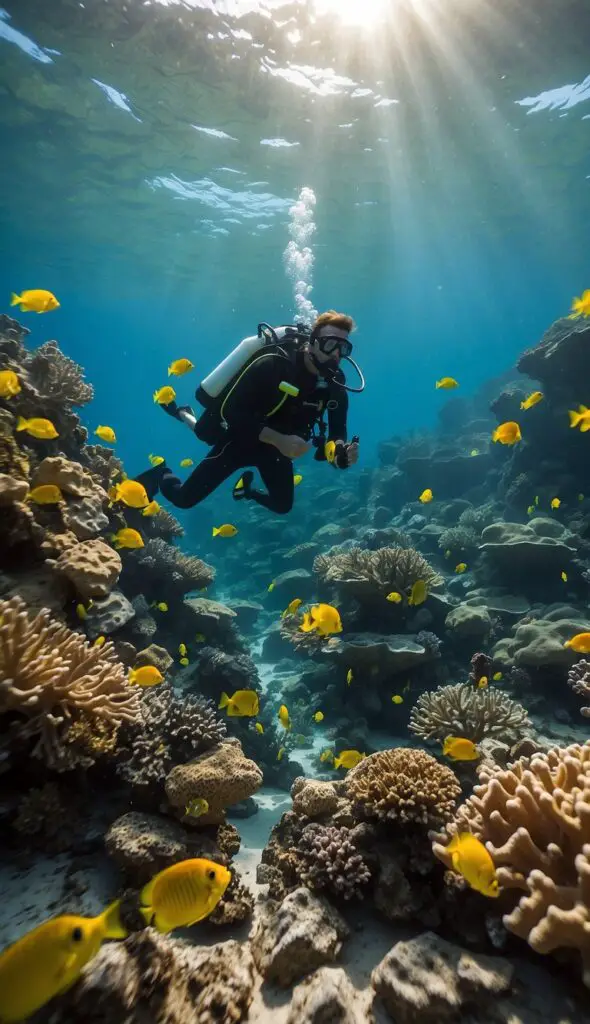Scuba diving in Phoenix, AZ offers a unique experience for both beginners and seasoned divers. With several reputable diving schools in the area, aspiring divers can easily find the perfect fit for their training needs. Options like Phoenix Scuba and Salt & Sea Scuba provide diverse courses, from beginner to advanced levels.

The journey to becoming a certified scuba diver in Phoenix starts with choosing the right course and dive center. Facilities such as Saguaro Scuba offer personalized lessons, ensuring each student receives the attention they need. These programs not only cover basic diving skills but also provide insights into safe diving practices and essential equipment knowledge.
In addition to foundational courses, advanced opportunities, such as the PADI Altitude Diver Specialty at Salt & Sea Scuba, allow divers to explore unique environments like mountain lakes. Whether you’re diving locally or planning future underwater adventures, Phoenix offers a comprehensive educational path to help you achieve your scuba diving goals.
Key Takeaways
- Phoenix has several top-notch diving schools for beginner and advanced divers.
- Certification courses include personalized training and essential safety tips.
- Specialized programs offer unique diving experiences to enhance skills.
Overview of Scuba Diving in Phoenix, AZ
Phoenix offers excellent opportunities for both new and experienced scuba divers. From vibrant dive shops to ideal conditions for learning and adventure, the city is a great place to pursue scuba diving certification.
Popularity of Phoenix Scuba
Scuba diving is increasingly popular in Phoenix. Many local residents and visitors seek out diving courses to explore underwater environments. Local dive shops, such as Diventures and No Limits Scuba, provide a range of scuba training programs. These shops offer courses for all skill levels, from beginner classes to advanced certifications.
Phoenix is attractive for divers due to its accessibility to various water bodies and professional dive instruction. The availability of guided trips and equipment rentals also boosts its popularity. Dive enthusiasts appreciate the comprehensive services provided by these local businesses.
Ideal Diving Conditions in Phoenix
Phoenix offers suitable diving conditions for learners and seasoned divers alike. The city’s climate ensures a year-round diving season with relatively stable water temperatures. This makes it easier for individuals to plan their training schedules without worrying about extreme weather disruptions.
The region provides access to diverse dive sites. For instance, Salt & Sea Scuba emphasizes their PADI Altitude Diver Specialty course, focusing on high-altitude lakes. These unique locations offer a different diving experience compared to typical ocean dives. Additionally, local facilities like Sea 2 Sea Scuba offer a broad range of equipment and gear, ensuring divers have what they need for any diving adventure.
In summary, Phoenix’s favorable conditions and well-established dive shops create an ideal environment for scuba diving enthusiasts.
Understanding Scuba Certification

Scuba certification ensures safe and enjoyable underwater experiences. Two major organizations, SSI and PADI, provide these certifications.
SSI vs PADI Certification
SSI (Scuba Schools International) and PADI (Professional Association of Diving Instructors) are the top organizations for scuba certification. Both offer similar courses but with some differences.
SSI allows flexibility with online learning and classroom sessions. They focus on comfort and equipment use. Instructors can adjust course pacing based on student needs, which can be beneficial for beginners.
PADI is the largest organization and widely recognized. Their structure is standardized worldwide. This consistency means that PADI certification is accepted at more dive shops globally.
Both certifications include theory and practical skills. Students learn about dive equipment, safety, and underwater navigation. The choice between SSI and PADI often depends on the availability of courses and personal preference.
Levels of Scuba Certification
Scuba diving certification has multiple levels. The most common entry-level is the Open Water Certification. This allows divers to go up to 60 feet deep with a buddy.
Advanced certification adds skills such as night diving or deep diving, allowing for more adventurous dives. Divers learn to dive to greater depths and in various conditions.
For professional levels, there are certifications like Divemaster or Instructor. These involve extensive training and experience. They enable divers to lead dives or teach others.
Each certification level builds on the previous one. Divers can choose to specialize in areas such as underwater photography or wreck diving. The path taken depends on individual interests and goals.
Getting Started with Scuba Certification

When embarking on your scuba diving certification journey in Phoenix, AZ, it’s crucial to choose the right dive center, understand the prerequisites needed for certification, and get an overview of the training process. Here are the key points to consider.
Choosing a Dive Center
Selecting a reputable dive center is the first step. Look for centers with experienced instructors and a range of courses. For instance, Phoenix Scuba offers diverse courses for children, families, and veterans. Make sure the center is certified by recognized organizations like PADI or SDI. Diventures in Phoenix, for example, provides PADI certifications, ensuring quality training. Check the class sizes and availability of private lessons. For personalized attention, Sonny’s Scuba specializes in private instruction with competitive pricing.
Prerequisites for Certification
Before you start, certain prerequisites must be met. Most centers require you to be at least 10 years old. A basic level of swimming proficiency is essential. You should be able to swim 200 meters without stopping and tread water for 10 minutes. A medical questionnaire often needs to be filled out, ensuring you’re fit for diving. Some centers like Saguaro Scuba provide specific guidelines on health and safety checks before starting the course. Ensure you meet these requirements to begin your diving training smoothly.
Training Process Overview
The training process typically includes three main components: knowledge development, confined water training, and open water dives. Knowledge development can be done online or in a classroom, covering the fundamentals of scuba diving and safety. Confined water training is conducted in a pool, where instructors demonstrate and practice essential skills. Finally, open water dives are conducted in real environments, giving you practical experience. No Limits Scuba offers comprehensive training that follows this structure. The entire certification process usually takes a few weeks to complete, with flexible schedules to accommodate different needs.
Scuba Training Sessions

Scuba training in Phoenix, AZ includes a variety of sessions to help divers gain the necessary skills and experience. Training typically involves confined water dives, open water dives, and specialty courses to enhance your diving knowledge.
Confined Water Dives
Confined water dives are the initial steps for new divers. They take place in a pool or a controlled water environment. These sessions focus on mastering basic scuba skills such as breathing underwater, clearing a mask, and regulator usage.
In Phoenix, facilities like Diventures offer confined water training to ensure safety and comfort. Instructors guide you through the steps, emphasizing proper technique and confidence building. These sessions are designed for both beginners and those needing a scuba skills update. Personalized attention ensures each diver progresses at their own pace.
Open Water Dives
Open water dives move the training from controlled environments to natural settings. These sessions are essential for achieving open water diver certification. Divers practice their skills in lakes, quarries, or ocean settings under real-world conditions.
No Limits Scuba offers comprehensive open water training, ensuring divers are well-prepared for diverse environments. Instructors accompany divers, providing guidance and support as they navigate open waters. These dives solidify foundational skills learned in confined water and introduce new ones, such as managing buoyancy in various conditions. Completing open water dives is a significant step toward becoming a certified scuba diver.
Specialty Courses Offered
Specialty courses enhance and expand diving skills beyond basic certification. Courses like stress & rescue teach divers how to handle emergencies and assist others in distress. Deep diving courses prepare divers for exploring greater depths safely. Meanwhile, search & recovery focuses on techniques for finding and retrieving objects underwater.
Facilities such as Saguaro Scuba and Aquatica Diving offer various specialty courses tailored to individual interests and goals. These courses often require a combination of classroom learning, confined water training, and open water practice. Specialty training ensures divers are well-equipped to handle specific challenges and enjoy a broader range of underwater experiences.
Scuba Diving Equipment Essentials
Understanding and selecting the right scuba diving equipment is crucial for safety and enjoyment underwater. Proper maintenance ensures your gear remains in top condition for many diving adventures.
Understanding Diving Gear
When starting out, divers must familiarize themselves with basic equipment. Essential scuba gear includes a mask, snorkel, fins, regulator, and buoyancy control device (BCD).
The mask allows clear vision underwater and should fit snugly without being too tight. A snorkel is useful for breathing at the surface without using air from the tank. Fins help with efficient movement, reducing energy use.
The regulator is vital as it delivers air from the tank to the diver. The BCD controls buoyancy, helping divers ascend, descend, and maintain neutral buoyancy efficiently. Each piece of gear plays a specific role in ensuring a safe and enjoyable dive.
Selecting Your Own Equipment
Choosing your own diving equipment can be daunting but rewarding. When selecting a mask, ensure it fits well and offers a good field of view. Anti-fog features are a plus. A snorkel with a purge valve can make clearing water easier.
For fins, consider comfort and the type of diving you plan to do. Open-heel fins with adjustable straps are popular for their versatility and comfort. The regulator should have a comfortable mouthpiece and reliable performance, even at depth.
Selecting a BCD involves choosing one that offers the right size, lift capacity, and features such as integrated weight systems. Each piece should be comfortable and suited to your diving style and preferences.
Equipment Maintenance
Maintaining your scuba gear ensures its longevity and reliability. After each dive, rinse equipment like the mask, snorkel, and fins with fresh water to remove salt, sand, and chlorine.
The regulator requires special care; rinse it while attached to a tank to prevent water from entering the first stage. Store it in a cool, dry place away from direct sunlight.
For BCDs, rinse the inside with fresh water and partially inflate it during storage to prevent creasing. Regularly check and service all equipment based on the manufacturer’s recommendations, ensuring everything remains in optimal working condition.
By understanding, selecting, and maintaining your scuba gear, you can enjoy safe and memorable dives for years to come.
Safety and Health Considerations

Scuba diving certification involves understanding vital health and safety aspects to ensure safe and enjoyable dives. Critical topics include buoyancy control, managing stress, and proper dive planning.
The Importance of Buoyancy Control
Buoyancy control is essential for safe and comfortable diving. It helps divers maintain neutral buoyancy, reducing effort and improving air consumption.
Proper buoyancy control protects marine life and prevents accidental damage to underwater environments. Buoyancy compensators are vital equipment, and training should focus on their effective use.
Beginners should practice using their buoyancy control devices (BCDs) in controlled environments. Learning to control ascent and descent rates minimizes the risk of decompression sickness and other health issues.
Managing Diving Stress
Diving can be stressful, especially for beginners. Recognizing and managing stress enhances safety and enjoyment. Anxiety can lead to poor decision-making and accidents.
Training should include stress management techniques such as deep breathing and remaining calm under pressure. Instructors often simulate stressful situations to prepare divers for real-life scenarios.
Knowing how to assist a stressed diver is also important. Recognizing signs of panic or anxiety in oneself or a buddy helps prevent escalation. Buddy systems and clear communication protocols significantly reduce stress.
Dive Planning and Safety Procedures
Thorough dive planning is crucial for safety. It includes pre-dive checks, route planning, and emergency preparedness. Divers should always check weather conditions, water currents, and visibility before entering the water.
Navigation skills are vital for avoiding disorientation underwater. Using dive computers or compasses helps maintain course and track time. A well-planned dive includes contingency plans for unexpected situations.
Emergency procedures like controlled emergency swimming ascents (CESA) and understanding how to use surface marker buoys (SMBs) are essential. Keeping a dive log helps track dive conditions, air consumption, and other factors, aiding in future planning and safety.
Advanced Scuba Diving Opportunities

For those looking to take their scuba diving skills to the next level, Phoenix, Arizona offers various advanced diving opportunities. These range from specialized certifications to local and international dive trips, allowing divers to explore unique dive sites.
Specialized Diving Certifications
Divers in Phoenix can enhance their expertise through various specialized courses. The PADI Altitude Diver Specialty at Salt & Sea Scuba teaches safe diving techniques for high-altitude lakes. For those interested in mixing safety with enhanced oxygen levels, enriched air nitrox certification is widely available. Night diving courses, like those offered at Diventures, focus on diving in low-light conditions, enhancing navigation skills.
Dive guide certifications are also an excellent choice for divers looking to lead others. These programs cover leading trips, safety protocols, and emergency management, and they are usually offered at facilities such as No Limits Scuba. With these certifications, divers gain the skills needed to guide others safely through underwater explorations.
Local and International Dive Trips
Phoenix-based dive centers offer a variety of trips for those ready to explore beyond local waters. Local trips often take divers to lakes and reservoirs throughout Arizona. This is a great way to put new skills into practice in familiar waters. For example, Saguaro Scuba provides tailored lessons that can be followed up with local excursions.
International travel packages are also available, allowing divers to explore exotic locations with expert-led groups. Destinations often include vibrant coral reefs, shipwrecks, and unique marine habitats not found in Arizona waters. Such trips offer a mix of adventure and learning, making them an ideal way to test advanced skills in diverse environments.
Exploring Unique Dive Sites
Phoenix divers have access to diverse and exciting dive sites. High-altitude diving is popular, especially since the PADI Altitude Diver Specialty equips divers with skills necessary for these unique locations. Mountain lakes present a different experience compared to sea-level diving.
Night dives provide another unique experience, offering a glimpse into underwater life after dark. This can be practiced locally through night diving courses at Diventures. These dives reveal different marine creatures and behaviors not visible during the day.
Enriched air nitrox allows for longer dive times and shorter surface intervals, making it easier to explore underwater sites thoroughly. The use of nitrox is especially beneficial for diving in remote locations where surface intervals need to be minimal. Facilities like Sea 2 Sea Scuba offer this training, enhancing the diving experience.
Scuba Community and Continuing Education

Phoenix is home to a vibrant scuba community with numerous opportunities to join local dive clubs, attend exciting events, and pursue further education to enhance diving skills.
Joining Local Dive Clubs
Local dive clubs are an excellent way for scuba enthusiasts to connect and share their passion. These clubs often organize regular dives, social gatherings, and training sessions. For instance, No Limits Scuba offers a community-oriented environment. Joining such a club provides a supportive network, making it easier to find dive buddies, share experiences, and stay motivated in continuing education.
Dive clubs also host seminars and workshops to keep members informed about the latest equipment and techniques. Membership often includes access to exclusive events and discounts at local dive shops.
Attending Scuba Events
Scuba events in Phoenix offer divers the chance to expand their horizons. Events range from local dive trips to international excursions, giving participants opportunities to explore new underwater environments. Diventures in Phoenix organizes various guided trips, which are excellent for both novice and experienced divers.
Workshops and expos are also common, providing a platform to learn about new gear, meet industry experts, and participate in hands-on demonstrations. Such events are invaluable for keeping up-to-date with advancements in scuba technology and techniques.
Further Educational Opportunities
Continuing education in scuba diving is essential for skill enhancement and safety. Phoenix offers a broad range of courses from beginner to advanced levels. Salt & Sea Scuba is a PADI 5 Star IDC Training Center, providing high-quality instruction that complies with international standards.
Advanced courses such as rescue diving, deep diving, and underwater photography are available. Programs like the Seal Team from Sea2Sea Scuba teaches basic and fun activities for kids, emphasizing the importance of starting young. By engaging in continued education, divers can achieve higher certifications and explore specialized interests within the field.
Practical Information for Scuba Divers

For scuba diving enthusiasts in Phoenix, AZ, it’s essential to know about available dive shop services, rental gear pricing, and local certification courses to ensure the best diving experience.
Dive Shop Services
Phoenix dive shops offer a variety of essential services for scuba divers. These services include equipment maintenance, air tank refills, and gear sales.
Shops like No Limits Scuba and Diventures provide professional services to ensure your gear is in top condition. They also offer guided diving trips and lake certifications, adding convenience for divers of all levels.
It’s important to choose a shop that has a range of services, including underwater photography equipment, first aid kits, and emergency oxygen.
Rental Gear Pricing
If you don’t own your gear, rental options are plentiful and well-priced in Phoenix. Dive shops offer rental packages that typically include a mask, fins, snorkel, BCD (buoyancy control device), and tanks.
For example, rental gear at Saguaro Scuba starts at competitive rates.
Sample Pricing:
- Full Gear Package: $50/day
- Single Tanks: $10 each
- Wetsuits: $15/day
Comparing prices across different shops can help you find the best deal. High-quality, well-maintained rental gear is crucial for a safe and enjoyable dive.
Local Certification Courses
Getting certified in Phoenix is straightforward with a variety of courses offered by local dive shops. Both PADI and SDI certifications are available, catering to beginners as well as advanced divers. Classes typically include both classroom and practical training, conducted in pools or local lakes like Lake Pleasant.
Courses vary in price and duration. For instance, Saguaro Scuba offers private lessons starting at $680, ensuring personalized training.
Types of Courses:
- Open Water Certification: Basics of scuba diving
- Advanced Open Water: Skills like deep diving and night diving
- Specialty Courses: Underwater photography, wreck diving
Certification courses often include rental gear, so check with the dive shop to see what’s included. This practical information will help you navigate the options and choose the right path to becoming a certified diver.
Frequently Asked Questions

This section answers common questions about scuba diving certification in Phoenix, including costs, program comparisons, and course duration.
What are the costs associated with obtaining a scuba diving certification in the Phoenix area?
The cost for obtaining a scuba diving certification can vary. Basic Open Water courses typically range from $350 to $500. This price often includes training manuals, equipment rentals, and the certification fee.
Which institutions offer the best scuba diving certification programs in Phoenix?
Top-rated institutions in Phoenix for scuba certification include Phoenix Scuba, No Limits Scuba, and Sea2Sea Scuba. Each offers a variety of PADI and other certification courses.
How does the PADI certification compare to SSI when choosing a scuba diving program?
PADI and SSI are both reputable organizations. PADI is known for its extensive network of dive centers, while SSI offers a flexible learning approach. Both certifications are globally recognized, but preferences often depend on training style and local availability.
What can I expect from the scuba certification test in terms of difficulty?
The test typically includes a written exam covering dive theory, followed by practical skills assessment in confined and open water. Most students find it manageable with proper study and practice. Instructors provide ample support and coaching throughout the process.
Are there any differences between PADI and SDI certification programs for scuba diving?
PADI focuses on standardized training with a large support network. SDI emphasizes technical diving and online learning options. Both offer quality training, but PADI may be more widespread, while SDI might appeal to those interested in advanced diving techniques.
What is the typical duration of a scuba diving certification course in Arizona?
A typical Open Water certification course takes around three to four days to complete. This includes classroom sessions, pool training, and open water dives. Some programs offer weekend or accelerated options to fit different schedules.






